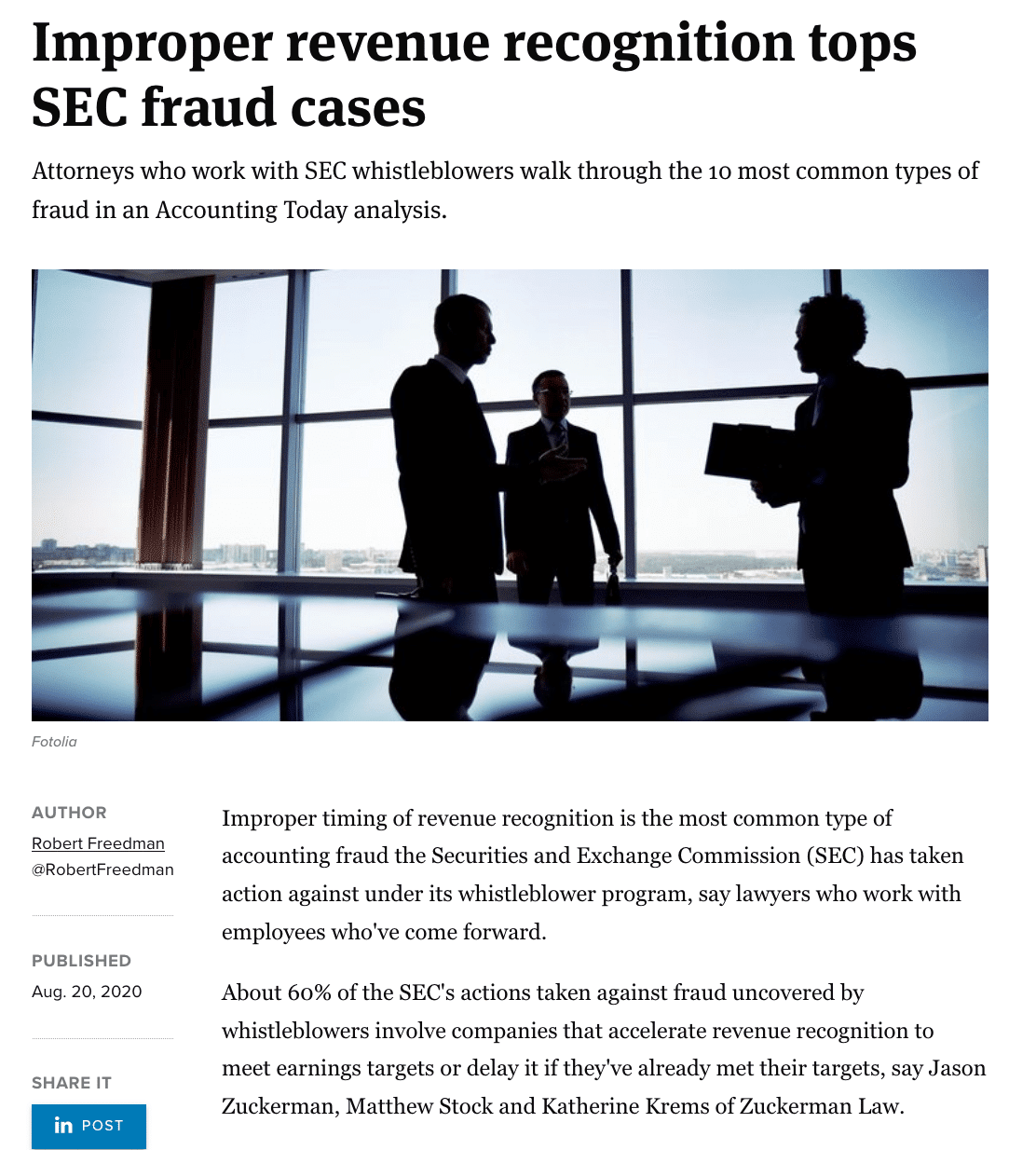
Improper Revenue Recognition and the SEC Whistleblower Program
On September 7, 2017, the SEC announced that financial services firm State Street agreed to pay more than $35 million to settle charges that it fraudulently charged secret mark-ups for transition management services. According to the SEC’s order, the scheme generated approximately $20 million in improper revenue for the firm. After a client discovered the overbilling scheme, State Street attempted to cover it up by blaming it on a “fat finger error.” The SEC later determined that this statement was a misrepresentation as the mark-ups were done intentionally.
We have successfully represented whistleblowers at the SEC disclosing revenue recognition fraud. For more information about revenue recognition schemes, see our article: How to Report Improper Revenue Recognition and Earn an SEC Whistleblower Award.
If you have information that may qualify for an SEC whistleblower award, contact the Director of our SEC whistleblower practice at [email protected] or call our leading SEC whistleblower lawyers at (202) 930-5901 or (202) 262-8959. All inquiries are confidential.






In conjunction with our courageous clients, we have helped the SEC halt multi-million dollar investment schemes, expose violations at large publicly traded companies and return funds to defrauded investors. Read our tips for SEC whistleblowers and Forbes column about the success of the SEC whistleblower program.
Contact us today to find out the strategies that we have successfully employed to secure SEC whistleblower awards for our whistleblower clients.
SEC Whistleblower Program and Revenue Recognition Fraud
Under the SEC Whistleblower Program, whistleblowers are eligible to receive an award for providing the SEC with original information about a violation of the federal securities laws, including improper revenue recognition. If the SEC uses a whistleblower’s information to bring a successful enforcement action, the whistleblower is eligible to receive 10% to 30% of the monetary sanctions collected as an award. Thus, if a whistleblower had provided original information to the SEC about State Street’s overbilling scheme, he or she could be eligible to receive an award of up to $10.5 million.
The SEC Whistleblower Program also protects the confidentiality of whistleblowers and does not disclose information that might directly or indirectly reveal a whistleblower’s identity. Moreover, whistleblowers can submit an anonymous tip to the SEC if represented by an attorney. Importantly, even compliance personnel, auditors (external and internal), accountants, officers, and directors may be eligible to receive rewards under the program.
Revenue Recognition Fraud SEC Whistleblower Awards
Since 2012, the SEC Whistleblower Office has awarded nearly $1 billion in awards to whistleblowers. The largest SEC whistleblower award to date is $114 million. Tips from whistleblowers have enabled the SEC to take enforcement actions resulting in more than $2.7 billion in financial remedies. In fact, one tip about accounting violations that improperly inflated revenue by $80 million has already resulted in a $22 million SEC award.
For more information about the SEC Whistleblower Program, see our eBook Tips from SEC Whistleblower Attorneys to Maximize an SEC Whistleblower Award. Click below to hear SEC whistleblower lawyer Matt Stock’s tips for SEC whistleblowers:
SEC Takes Aim at Improper Revenue Recognition
According to a Report Pursuant to Section 704 of the Sarbanes-Oxley Act of 2002, during the five years preceding the enactment of SOX, the “SEC brought the greatest number of actions [involving issuer financial-report violations] in the area of improper revenue recognition: 126 of the 227 enforcement matters involved such conduct, including the fraudulent reporting of fictitious sales, improper timing of revenue recognition, and improper valuation of revenue.” Years later, the SEC continues to focus on issuer reporting and disclosure violations, including improper revenue recognition.
According to the SEC’s 2020 Annual Report to Congress on the SEC Whistleblower Program, a majority of whistleblowers tips submitted to the SEC Whistleblower Program relate to violations with corporate disclosures and financials:
- In FY 2011, 51 tips related to corporate disclosures and financials.
- In FY 2012, 547 tips related to corporate disclosures and financials.
- In FY 2013, 557 tips related to corporate disclosures and financials.
- In FY 2014, 610 tips related to corporate disclosures and financials.
- In FY 2015, 687 tips related to corporate disclosures and financials.
- In FY 2016, 938 tips related to corporate disclosures and financials.
- In FY 2017, 954 tips related to corporate disclosures and financials.
- In FY 2018, 983 tips related to corporate disclosures and financials.
- In FY 2019, 1,107 tips related to corporate disclosures and financials.
- In FY 2020, 1,710 tips related to corporate disclosures and financials.
A 2016 Harvard article also found that the most common SEC enforcement actions concerning accounting violations are related to “inaccurate representations of revenue.”
As discussed in an article in CFODIVE titled Improper revenue recognition tops SEC fraud cases, the SEC continues to focus on revenue recognition fraud, and whistleblower disclosures about improper revenue recognition schemes may qualify whistleblowers for an SEC whistleblower award.
SEC Enforcement Actions for Improper Revenue Recognition
The following SEC enforcement actions are examples of the types of improper revenue recognition schemes that could qualify for an SEC award:
Fraudulent Overbilling Schemes
- SEC v. Garthright: The SEC charged SMF Energy Corp. and its officers with accounting fraud for inflating revenues through a fraudulent billing scheme. According to the SEC’s complaint, the billing scheme “increased the amount of gallons of fuel invoiced beyond what was actually delivered to customers,” which resulted in false and misleading disclosures in the company’s SEC filings. The billing scheme circumvented SMF Energy’s internal accounting controls and led to, among other things, materially overstated revenues, profit margins, shareholders’ equity, and net income in its SEC filings. The scheme resulted in several SEC violations, including the failure to maintain a system of internal controls sufficient to ensure that its customers were charged in accordance with their respective contracts, the failure to record revenues and liabilities in accordance with GAAP, and the failure to design (or to cause others to design) disclosure controls and procedures that would have caused the company to disclose and report that it recognized revenue from improper charges to customers. The SEC disgorged all ill-gotten profits and proceeds received as a result of the actions.
- SEC v. MedQuist, Inc.: The SEC charged MedQuist with accounting fraud when it secretly inflated customer bills by increasing the number of lines of medical test that it purportedly transcribed. According to the SEC’s complaint, the “scheme was able to continue for several years because the unit of measure upon which bills to many customers were based . . . could not be verified by customers. Knowing that its customers were unable to verify line counts on bills, [MedQuist] . . . manipulate[d] line counts on customer bills to reach specific revenue and margin targets.” MedQuist and its Director, President, and Chief Operating Officer were charged with violating securities laws.
Improper Timing of Revenue Recognition
- SEC v. L3 Technologies, Inc.: The SEC charged L3 for failing to maintain accurate books and records and failing to maintain adequate internal controls when the company improperly recorded $17.9M in revenue from a contract by creating invoices associated with unresolved claims that were not delivered when the revenue was recorded. According to the SEC’s order, employees “immediately reported concerns regarding potential violations of L3’s accounting policies and internal accounting controls to L3’s internal ethics department,” but the subsequent ethics review failed to uncover the misconduct due, in part, to “a failure by ethics investigators to adequately understand the billing process.”
- SEC v. Dickson: The SEC charged IGI Inc. with fraudulent accounting practices and reporting, inadequate internal controls, and books-and-records violations for engaging in fraudulent sales-cutoff practices and other improper accounting practices. As a result of the improper sales-cutoff practices, “IGI misstated its assets, revenues, and net income” for several years.
- SEC v. Alere Inc.: On September 28, 2017, medical manufacturer Alere Inc. agreed to pay more than $13 million to settle charges that it committed accounting fraud through its subsidiaries. According to the Order, Alere’s subsidiary in South Korea improperly inflated revenues by recording sales for products that were being stored at warehouses or otherwise not yet delivered to the customers. The SEC uncovered this “bill and hold” scheme along with other improper revenue recognition practices at several other subsidiaries.
- SEC v. Maxwell Technologies, Inc.: Maxwell Technologies paid $2.8 million as a penalty for a scheme to grow revenue by booking contingent sales of auto parts as revenue. Evidence of the scheme included falsified purchase orders and secret side arrangements to keep the scheme hidden.
Fictitious Sales
- SEC v. Putnam: The SEC charged Anicom Inc. and its directors with violating federal securities laws after the company falsely reported millions of dollars of nonexistent sales to inflate net income by more than $20M. According to the SEC’s complaint, Anicom included in its financial statements millions of dollars in sales to a fictitious customer, SCL Integration.
Tips for Qualifying for an Revenue Recognition SEC Whistleblower Bounty
SEC Whistleblower Lawyers Representing Revenue Recognition Whistleblowers
If you have information that you would like to report to the SEC, contact an SEC whistleblower attorney at leading whistleblower firm Zuckerman Law for a free, confidential consultation about your case by calling 202-262-8959.






For more information about SEC whistleblower rewards and protections:
- See our column in Forbes: One Billion Reasons Why The SEC Whistleblower-Reward Program Is Effective.
- See our column in Going Concern: Sarbanes-Oxley 15 Years Later: Accountants Need to Speak Up Now More Than Ever.
- See our post in Accounting Today: Whistleblower Protections and Incentives for Auditors and Accountants.
- See our post in The Compliance and Ethics Blog: Shkreli Trial Reveals the Challenges Faced by Compliance Whistleblowers.





